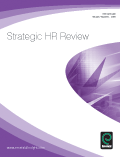Unlocking the value of HR to drive a change-ready culture
strategic change
 Strategic HR Review is a bi-monthly academic journal from Emerald Publishing.
Strategic HR Review is a bi-monthly academic journal from Emerald Publishing.
It is a leading publication for senior HR professionals.
“Unlocking the value of HR to drive a change-ready culture” was published in the August 2017 Edition. It is an edited version of the HR Transformation Case Study in Chapter 34 of ‘The Change Catalyst’.
Article: Unlocking the value of HR to drive a change-ready culture (Strategic HR Review, August 2017 Edition. Vol. 16 Issue: 4, pp.171-176)
Author: Campbell Macpherson, Change & Strategy International Ltd, London.
Purpose: This paper aims to present a case study focused on developing a change-ready culture within a large organization.
Methodology/Approach: This paper is based on personal experiences gleaned while driving an organization-wide culture change program throughout a major financial advisory firm.
Findings: This paper details over a dozen key lessons learned while transforming the HR department from a fragmented, ineffective, reclusive and disrespected department into one that was competent, knowledgeable, enabling and a leader of change.
Originality/Value: Drawing on the real-world culture change intervention detailed here, including results and lessons learned, other organizations can apply similar approaches in their own organizations – hopefully to similar effect.
Extract of the article:
“Culture is everything” declared Louis Gerstner when he was CEO of IBM.
He was half right. Execution is actually everything. It does not matter how innovative, clever or expensive your strategy may be – unless your organization is ready, willing and able to deliver it – the strategy will have been a complete waste of time.

